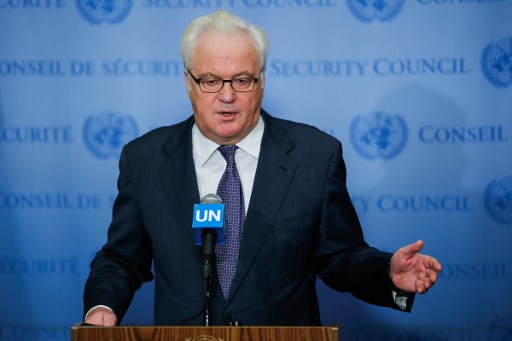UNITED NATIONS—Russia on Friday failed to win re-election at the United Nations Human Rights Council in a vote rights groups said reflected international disapproval of Moscow’s involvement in the war in Syria.
The UN General Assembly elected Hungary and Croatia instead to represent eastern Europe at the 47-nation council, which monitors and investigates rights violations worldwide.
The outcome was an upset for Russia, which has been a member for all but one year since the council was set up in 2006.
Asked about the defeat, Russian Ambassador Vitaly Churkin quipped: “We need a break.”
“Croatia and Hungary fortunately, because of their size, they are not as exposed to the winds of international diplomacy. Russia is quite exposed,” he said.
“We have been there a number of years. I am sure next time we are going to get it.”
More than 80 human rights and aid organizations had urged UN member-states to vote Russia off the council for its military support of President Bashar al-Assad in Syria’s bloody civil war.
Russia has been accused by Western powers and rights groups of indiscriminate bombings in the Syrian government operation to seize rebel-held eastern Aleppo.
Some 250,000 civilians in east Aleppo have been living under siege since July and food rations are expected to run out soon, the United Nations has warned.
“It clearly will be a wakeup call to Moscow,” said John Fisher, Human Rights Watch’s Geneva director.
“We sincerely hope that the message they will take from today’s vote is the need to make sure their engagement in Syria corresponds with international human rights and humanitarian law.”
Russia picked up 112 votes, while Croatia won 114 and Hungary 144. The three countries were competing for two regional seats.
It was only the second time that a permanent Security Council member was voted off, after the United States in 2001 lost its seat on the Commission of Human Rights, the council’s predecessor.
“They bomb a hospital one day, they run for the Human Rights Council the next. And they wonder why they missed the cut?” commented a Western diplomat, who declined to be named.
The 193 member-states voted to fill 14 seats at the Geneva-based council.
Human Rights Watch had warned that a vote to re-elect Russia and Saudi Arabia risked weakening the council in its work to hold abusers to account.
Saudi Arabia is back
Saudi Arabia, which was re-elected with 152 votes, was almost guaranteed to retain its seat as part of a clean slate of four countries vying for four regional seats.
China, which has been criticized for its rights abuses, was also re-elected, while Cuba and Egypt, also cited for their dubious rights records at home, won seats as well.
Croatia, Iraq and Rwanda were elected for the first time.
The other elected members were Brazil, Britain, Japan, South Africa, Tunisia and the United States.
Saudi Arabia secured its seat despite an outcry over the military campaign waged by the Saudi-led coalition in Yemen, which has left nearly 7,000 people dead, mostly civilians.
The coalition has carried out air strikes in Yemen that have hit civilian targets such as a community hall in Sanaa that was recently destroyed during a funeral, killing more than 140 people.
“The non-election of Russia shows that the nations of the world can reject gross abusers if they so choose. This makes the election of Saudi Arabia, China and Cuba even more preposterous,” said UN Watch executive director Hillel Neuer.
Created in 2006, the rights council monitors violations and notably set up a groundbreaking commission of inquiry on North Korea that led to calls for war crimes prosecutions of the Pyongyang regime.
The council this month asked the commission of inquiry for Syria to carry out a special investigation of rights abuses in Aleppo.
RELATED STORIES
Nearly 500 dead, food running out in Aleppo—UN chief
Russia says UN meeting cancelled over US objections
